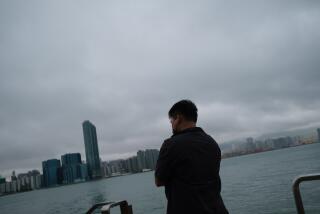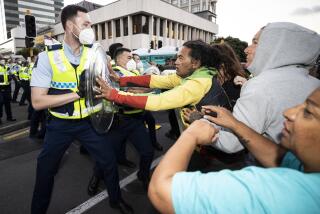Hong Kong police: ‘We have exercised maximum tolerance’
- Share via
Reporting from Hong Kong — After stealing a short nap in a police van, the veteran officer was back on the streets early Sunday morning to kick off what would likely be his second consecutive 17-hour shift.
Eyes puffy with fatigue, he kept his distance from the swarm of pro-democracy demonstrators occupying a typically busy intersection of Hong Kong’s Mong Kok district.
“We just want this to be over,” said the officer, 40, who declined to give his name because he was not authorized to speak to the media. “This is not the real Hong Kong. This is a peaceful city.”
Indeed, Hong Kong is one of the safest cities in the world, with a crime rate about half that of Los Angeles and New York.
But these are trying times for one of Asia’s most well-regarded police forces as it faces Hong Kong’s greatest social crisis in recent memory.
“Police are facing an unprecedented challenge,” Steve Hui, a department spokesman, said Sunday at a press conference aimed at winning back public support.
“We have exercised maximum tolerance,” he added. “The goal is to not provoke even more resentment and negative emotion among demonstrators.”
Heavy scrutiny of the 37,000-member department began eight days ago when police deployed tear gas on Hong Kong Island to push back demonstrators. It was the first time tear gas had been used in Hong Kong since 2005, when protesters amassed against a World Trade Organization summit. Many Hong Kong residents were stunned by what they thought was excessive force for a department that rarely has to deal with violent crime in a city of 7 million.
Police defended the move, saying the tear gas prevented a repeat of a 1992 stampede in a popular bar district on Hong Kong Island that left 21 people dead.
Anger intensified Friday when police were accused of deliberately choosing not to protect democracy demonstrators from violent mobs in Mong Kok, resulting in scuffles and bloodied occupiers.
A few of the assailants were proved to be members of organized criminal gangs, or triads. Demonstrators have accused the police of working in concert with the gangs to pressure them to abandon their sit-ins. They also say officers did not arrest men who had assaulted and even groped some of the protesters.
“These cops have lost their minds,” said Oscar Ng, a 23-year-old university student at the Mong Kok sit-in. “I’m really disappointed in them. It seems like they’re arbitrarily choosing when to step in and enforce the law.”
Paul Edmiston, a Hong Kong police commander, said morale remained high on the force despite the long hours and mounting criticism.
“It’s all rubbish,” Edmiston said Sunday about speculation police chose not to protect the protesters. “No matter what we do, we’re criticized for doing too little or too much. We can’t win.”
Pressure is growing on the local police to resolve the standoff with protesters in key parts of the semi-autonomous Chinese city.
Demonstrators are calling for free elections to choose Hong Kong’s next chief executive, the city’s top post. They’re also demanding that the current leader, Leung Chun-ying, step down.
Official state media in China has attacked the democracy movement, warning of dire consequences if it continues.
That’s prompted fears of a Tiananmen Square-style crackdown from People’s Liberation Army troops stationed in the former British colony.
But Edmiston, who joined the force nine years before the British handed Hong Kong back to China in 1997, said the impasse with protesters would be solved internally.
“I cannot envision any situation in which the PLA would be called in,” he said. “The Hong Kong police force can handle anything.”
Police maintained a significantly larger presence in Mong Kok on Sunday than days past. Officers regularly intervened to separate demonstrators and counter-demonstrators throughout the day.
“Police, clear the way,” chanted opponents of the democracy protesters.
Demonstrators were preparing for a major confrontation Sunday, the day before the city’s chief executive said roads had to be cleared to allow residents to get back to school and work.
In the early afternoon, Edmiston said he still had not received an order to remove the blockade in Mong Kok, a highly dense commercial and residential neighborhood.
But when he does, he said demonstrators would be given ample time to leave before police would again use tactics such as tear gas.
“If you see police with masks on, you’ve got a problem,” he said.
Staff writer Julie Makinen contributed to this report.
Follow @dhpierson for news from Hong Kong.
More to Read
Sign up for Essential California
The most important California stories and recommendations in your inbox every morning.
You may occasionally receive promotional content from the Los Angeles Times.













